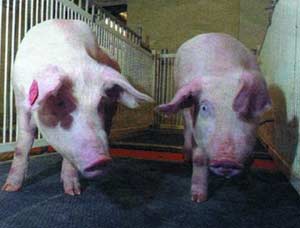Researchers have cloned a pig that has… fish fat, not pig fat! Bacon and pork ribs will soon be very heart-healthy. However, the benefits of this research, published in the journal Internet Nature Biotechnology, remain theoretical for now.
 |
|
(Photo: TTO) |
Omega-3 fatty acids, known for reducing the risk of cardiovascular disease, are primarily sourced from fish fat. The remaining question is whether they retain their effectiveness when introduced into pork.
The market launch of this genetically modified organism (GMO) product is sure to face opposition from many people. More than a dozen animals have been created since the birth of the sheep Dolly. Using this technique to improve the nutritional quality of livestock marks a significant initial advancement.
Alexandre Leaf, a professor of medicine at Harvard University, asserts that one day we will have omega-3 pork in our kitchens. People will be able to enjoy their favorite meat without fear.
Years ago, it was recommended to eat fish exclusively. However, fish can be expensive, many people do not like it, and fish high in omega-3s, such as mackerel, may contain dangerous mercury. This poses a significant dilemma for nutritionists. Therefore, experts from Harvard Medical School, the University of Missouri, and the University of Pittsburgh Medical Center conceived the idea of altering the genetic structure of pigs. The result: five white piglets with meat containing… fish fat!
According to Dr. Jing X. Lang, a professor of medicine at Harvard, who leads this research project, cloning pigs is just the beginning; there will also be cows and hens whose milk and eggs will contain omega-3!
It will take several more years before these products are allowed on the market because the cloning process risks creating sick animals, and we still need to see if this type of meat poses any health risks to humans.
For Dr. Lichtenstein from Tufts University, many questions remain unanswered: Is omega-3 truly important for human health? Does omega-3 in meat function the same way as in fish? Is it really a good idea to introduce omega-3 into foods like pork, which contains saturated fats and cholesterol that pose a risk for cardiovascular diseases?
The fish fat pigs were born in November 2005 and are reaching maturity to reproduce. Pigs are commonly used for cardiovascular research, and cloned pigs are creating a new future. Instead of comparing the number of people who consume high omega-3 foods with those who do not, scientists can now directly ask: Is eating fish fat pork safer than eating regular pork?
TRUNG LÊ


















































